Cixin Liu the Superstar: How Taking a Risk on a Chinese Author Paid Off Big For Tor
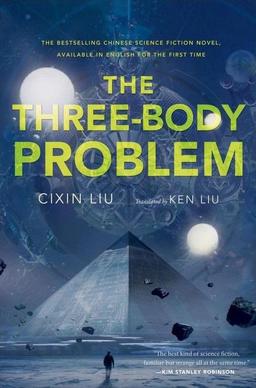 One of the great things about science fiction conventions is getting to rub shoulders with your heroes.
One of the great things about science fiction conventions is getting to rub shoulders with your heroes.
Some years ago I received an advance proof of an upcoming fantasy from Bantam Spectra, just before heading to Archon in St. Louis. I threw it in my luggage, and brought it to the author’s reading. There were only seven people in the audience, so afterwards I got to have a nice chat with the author, and he graciously signed my book for me. The writer was George R.R. Martin, and the book was A Game of Thrones.
In fact, writers who will draw huge crowds in public can often be vastly more approachable at small conventions. Perhaps this is because seeing Neil Gaiman at your local library is a big deal, but hanging out with him at the bar at World Fantasy is just a lot more casual.
Of course, there are rare exceptions. There are a few writers treated like superstars, even among fellow professionals. I saw it happen when Stephen King came to my home town of Ottawa for the World Fantasy Convention in 1984, and autograph lines spontaneously formed whenever he sat down. I got in line an hour early just so I could be in the front row during his reading from The Talisman (and ended up giving up my seat anyway, just so Tabitha King wouldn’t have to stand in the back.)
And I saw it happen again in June of this year, when the hottest new writer in science fiction, Cixin Liu, author of the Three-Body trilogy (The Three-Body Problem, The Dark Forest, and Death’s End), arrived in Chicago for the Nebula Awards weekend.
Mr. Liu was in making his first trip to the United States as a published author to be on hand for the presentation of the awards. His first novel in English, The Three-Body Problem, published by Tor in November of last year, was up for Best Novel.
Cixin Liu, New Genre Superstar
[Click the photos for bigger images.]
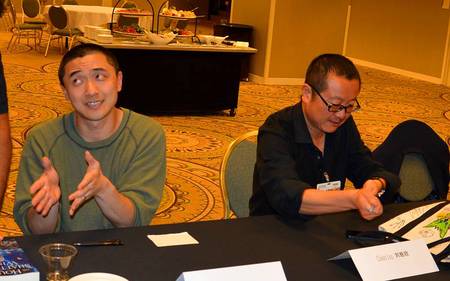
It was like Stephen King in 1984 all over again. The buzz started immediately, bare minutes after Mr. Liu arrived and checked in at the registration counter. People started craning their necks, saying, “Is it him?” I was standing by the counter when noted book collector Dave Willoughby raced past me, heading to his hotel room to collect the copies of The Three-Body Problem he had standing by for just this eventuality. “It’s him,” he whispered breathlessly as he dashed by.
Mr. Liu barely had time to stroll across to the book giveaway table when the first line formed. Convention attendees cleared off a section of the table, and pressed him into service autographing books. I wandered out to check on a panel, and when I came back fifteen minutes later, Mr. Liu was still there, and if anything, the line had gotten longer.
While Cixin Liu was signing autographs, I had the chance to speak to his two traveling companions. They seemed not at all surprised at the treatment Mr. Liu was receiving.
“In China, he is a superstar,” one of them explained to me.
The Problem of Translated Fiction
I have a confession to make. I’m not the biggest fan of novels in translation. In fact, when I first saw a copy of The Three-Body Problem, I was instantly intrigued… until I saw that it was translated from Chinese.
My interest flagged immediately. Everybody knows translated science fiction doesn’t sell in the U.S, I thought. What was Tor thinking?

But it wasn’t long before the buzz started. And then the serious buzz. The book was nominated for the Nebula award, and then a Hugo. Not every book nominated for major awards also finds an audience, but this one sure did. By early spring it was obvious Tor had a major hit on their hands.
Something else that became obvious was that Tor — and the book’s editor at Tor, Liz Gorinsky — are a helluva lot smarter than I am.
Now, I know a lot of smart people in the publishing business. I may not be one of them, but I’m smart enough to know that publishing a Chinese book in translation — and ponying up the kind of marketing and promotion dollars Tor did — takes more than just smarts. It takes courage. Offering a book like this to the U.S. market was clearly a risk. Both the kind of risk you don’t see very often, and the kind of risk that, when it works, can transform the genre.
I wasn’t just lucky enough to meet Cixin Liu at the Nebula Awards weekend here in Chicago. I also met Liz Gorinsky. Gorinsky is the kind of person who always seems to be in motion — always moving, always talking (frequently both at once). But she’s also remarkably friendly, and was happy to sit down with me to talk about the book. I was glad for the opportunity to share my amazement at both the success of The Three-Body Problem, and in her ability to clearly see the kind of market-changing potential in its author, Cixin Liu, that most of the rest of us didn’t.
I didn’t mean it to turn into an interview, but it sort of did. Liz and I carried on the conversation via e-mail and phone over the next few months, and in that time she shared some terrific insights into American science fiction and fantasy publishing — and pulled back the curtain on what it took to get The Three-Body Problem into print in the United States.
The first thing I was curious about was what kind of obstacles she ran into trying to publish the book. Somebody at Tor is a genius — is it her? Was there internal resistance? Did she have to tie Tom Doherty to a chair and read it out loud? What about the sales team? What did she have to do the make this book happen?
Here’s Liz:
I’ve been talking to people about the logistics of publishing translated fiction for several years before I actually did it, and the thing that I heard the most often was that the “getting the text translated” part was generally the hardest. I’m sure that’s true in most cases, but we were lucky in this regard. The Three-Body Trilogy was pitched to us by a Chinese textbook exporting company called China Educational Publications Import & Export Corporation (CEPIEC), known in some contexts as China Classics International, who found me via author/translator Meizi Wang and eventually Ken Liu’s agent Joe Monti. CEPIEC paid for the translation of the first book up front, and promised to translate the other two, so I could evaluate it much as I would any English text. CEPIEC’s original proposal tapped Ken Liu and Joel Martinsen to translate the first two books and a third translator for the third, though they eventually wound up bringing Ken back for the third book.
Much of the publication process for any book at a big publishing house is selling that book over and over again, first to the publisher and associate publisher, then to the core sales/marketing/publicity staff at Tor, and then to the larger sales force who sells the book to the outside world. For Three-Body, there was certainly some resistance at every level since many translations have done worse than expected in the American market — and this happens often enough that very few markers of success for a foreign publication, including strong sales (in this case, upwards of two million copies for the trilogy), great reviews, or even the quality of the text, are thought to be reliable predictors of whether the book will appeal to American audience.
Even though Liu Cixin is a star in China, he was virtually unknown here when we started the process, so some people at Tor probably thought of this series as a prestige project that would inevitably do poorly. Luckily, I managed to convince a few people around the house either that Three-Body was a great book completely aside the translation story, or, failing that, that people would be specifically interested in Three-Body because we’re in a moment where Americans are very curious about China’s role in the global cultural landscape, but genuine cultural artifacts from China are still relatively thin on the ground, so this book could potentially appeal to many of those cultural tourists.
In most other senses, the process of publishing Three-Body has been substantially the same as with other projects. The editing process is a slight exception, since I stopped short of doing a full edit because we wanted our edition to be substantially similar to the Chinese version, so I did not ask to change anything that I considered material, even in cases where I might have if we were the first publisher. I did do a somewhat substantial line edit, which was fairly standard except that the translators took point on approving or rejecting the prose changes and conveyed any queries that required author input to Liu Cixin.
Working With China
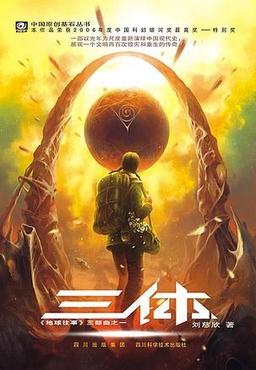
As you can see, the deeper we got into the conversation, the more fascinating it became. I’d been chiefly concerned at the outset with the challenges of selling a Chinese novel to an American audience, but there were bigger issues involved.
When translating a text from the People’s Republic of China, you are of course also dealing with the state. I assume that process was intimidating. (I get intimidated just dealing with the check out clerk at Target. Lady, get your hands off my new underwear.) So trying to edit a novel with the state looking over your shoulder had to be awkward, to say the least.
So I pestered Liz with questions on this aspect of the deal. What was that like?
The company we worked with, CEPIEC, is a state-owned textbook importer and exporter. I believe this was their first experience packaging and selling a work of fiction. This part of the process was challenging in new and exciting ways nearly every day, but I’m afraid I can’t go into much detail on the record about our interactions with a business partner.
However, I think it’s safe to say that it turns out that many publishing practices that are basically immutable established practice in the English-speaking publishing world are quite different from the assumed practices in Chinese publishing. As a result, we wound up having many intense discussions about why Tor favored particular terms or strategies for everything from schedules to payment to production processes to pricing to the degree to which established contract terms need actually be adhered to.
Luckily, we haven’t had much interaction with Chinese governmental groups other than CEPIEC, but we do occasionally have to contend with interviews or articles about the series being blocked on the Chinese internet, or concern about copies of The Three-Body Problem being stopped by Chinese censors because a scene about the Cultural Revolution that was moved to the middle of the Chinese edition is at the beginning of the English edition.
Okay, so much for the easy stuff. What about the challenges in marketing the book?
I know from experience that readers gravitate towards the familiar when shopping for reading material. How did Tor overcome most readers’ unfamiliarity with Chinese SF?
Our efforts to publicize and market Three-Body outside of Tor had two major streams: firstly, we were selling it to the core SF fandom. I was less concerned about winning over readers who are set in their ways, since people who prefer comfortable or familiar reading might indeed find this series somewhat discomfiting, so the process of promoting Liu Cixin within the SF community has been pretty similar to selling any new, exciting first-time novelist who people haven’t heard of yet.
Even readers who didn’t think they liked reading books in translation would often come around once they saw the copious amount of blurbs from English-speaking science fiction authors; or were curious about the translation work of Ken Liu, who had considerable buzz behind him even before his first novel, since he was the only writer to win the Hugo, Nebula, and World Fantasy Awards for a single work of fiction; or maybe they’d read an excerpt or two and see if they’re excited to continue on from there.
Then there’s an entirely separate group of readers for whom the main appeal is curiosity about how such a massive bestseller in China would translate to the US, an impulse that led to effusive coverage in The New York Times, Wall Street Journal, The New Yorker, NPR, and Gizmodo, all of which rarely cover science fiction under normal circumstances, but were excited by this book. The fans who came to the book for the metastory rather than pure SF fandom have produced some of the most unusual word-of-mouth I’ve encountered in my career: for example, I’m not sure that the Harvard Law School book club has ever paid much attention to science fiction books before this.
Success
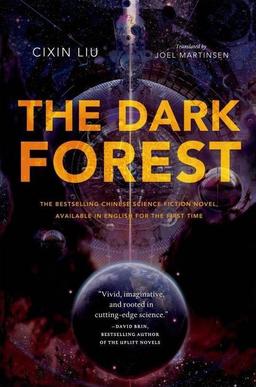 Watching the books’ enormous success has been a genuine education.
Watching the books’ enormous success has been a genuine education.
At the Saturday night autograph session at the Nebula Awards weekend, the scene that occurred when Cixin Liu arrived at the hotel was repeated on a much larger scale. Greg Ketter, a bookseller who set up a table inside the autograph room, told me he was selling copies of The Three-Body Problem as fast as he could put them out.
There were nice, steady lines of fans queuing up to meet authors like Larry Niven, who was being honored with a Grand Master Award, and Connie Willis, who’s received eleven Hugo Awards and seven Nebula Awards over a long and distinguished career. But they were dwarfed by the long line of fans in front of Cixin Liu and his translator, Ken Liu.
All this attention for a man who’d published a single novel in English.
The Three-Body Problem didn’t win the Nebula Award for Best Novel in June (that honor went to Annihilation, by Jeff VanderMeer). But earlier this month, it was awarded the genre’s highest award, the Hugo Award for Best Novel, at the World Science Fiction convention in Spokane, Washington. It has continued to sell briskly in hardcover, and on August 11th, Tor released the sequel, The Dark Forest (translated by Joel Martinsen) in hardcover, to wide acclaim.
This kind of overnight success doesn’t happen very often. In fact, it’s often tough for translated fiction to attain any kind of success.
I’m a Canadian, and by nature interested in Canadian science fiction and fantasy — including French Canadian SF, which arises from a rich and very different culture than English-language SF. The very best French Canadian science fiction is often cherry picked by large publishers, and translated into English for American audiences.
And so it’s been frustrating to watch as some of the biggest names in French Canadian SF — such as Joël Champetier (The Dragon’s Eye) and Yves Meynard (The Book of Knights, Chrysanthe) — get constantly overlooked by American readers.
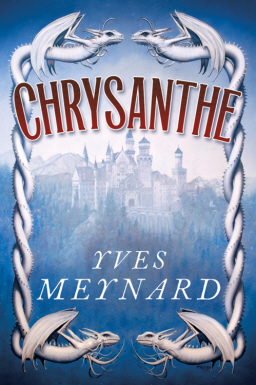 It’s not for lack of quality. Ursula K. Le Guin called Meynard’s The Book of Knights “An unpredictable, brilliantly imaginative, and very engaging fantasy,” and in 2012 Locus magazine, commenting on editor David Hartwell’s annual accomplishments, said:
It’s not for lack of quality. Ursula K. Le Guin called Meynard’s The Book of Knights “An unpredictable, brilliantly imaginative, and very engaging fantasy,” and in 2012 Locus magazine, commenting on editor David Hartwell’s annual accomplishments, said:
In terms of both mature craft and originality of imagination, Hartwell’s major discovery this year has to be the French-Canadian writer Yves Meynard.
And Jo Walton, in her delightful article Eight Books From the Last Decade that Made Me Excited About Fantasy, said:
Yves Meynard’s Chrysanthe is in the tradition of Gene Wolfe and Roger Zelazny, and beyond that of Dunsany and Mirrlees. It also has modern sensibilities, and because Meynard is from a different culture — he’s an award-winning novelist in French — it’s distinctly different from most of what we see on the shelves labelled as fantasy. This is a quest through shadows that leads to unexpected places. So much fantasy uses magic in a logical way — I’ve called it “realist magicism.” Of everything I’ve mentioned here, only this and A Stranger in Olondria are doing anything that isn’t that. I like it to make sense, but I also like the incredible flowering of the imagination you get in things like Chrysanthe.
However the English language edition of Chrysanthe, published by Tor in March 2012, disappeared without a trace. It never even received a mass market paperback edition.
It’s a hard fact of life, but there it is: Books in translation are a hard sell, even for Tor.
So was Tor surprised by the success of The Three-Body Problem? Did they anticipate this kind of reaction?
Here’s Liz again.
Three-Body has been more successful than we expected by any measure. I can’t reveal sales data for books we publish, but I can confirm that the book has sold more copies than the vast majority of books we publish, especially by authors who are new to our list. And the amount of fantastic reviews (including two starred reviews in trade journals) and awards attention has been fairly staggering: In addition to the Hugo, Nebula, and Locus award nominations, it has been nominated for the John W. Cambell, the Prometheus, Reddit’s first annual PrintSF awards, and the Chinese American Librarians Association Best Book awards.
The fact that Three-Body is the first translated book to be nominated for any of these SF awards since Calvino’s Invisible Cities is both baffling and gratifying as heck. And I’ve even heard — though I have no way of verifying this — that Three-Body may be the most successful novel ever to be translated from the Chinese. To say that we were not expecting or counting on any of this would be a massive understatement.
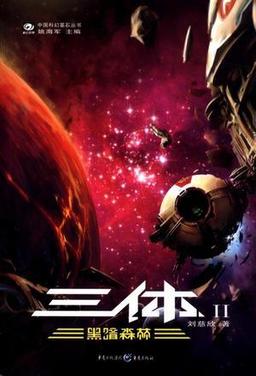
Has the success of The Three-Body Problem made it easier for Liz (and Tor) to consider more Chinese SF (or foreign SF in general?) Now that they’ve been through the process, would they do it again with another author?
And what advice would they offer another publisher considering a Chinese text?
Three-Body’s success has certainly helped pave the way for future projects of this sort to some degree. For example, I was able to acquire an anthology of short Chinese science fiction edited by Ken Liu based directly on this book; and in the process of launching my second translation project, a novel by Dutch writer Thomas Olde Heuvelt, I could tell our sales force that though they were often dubious of translation projects, they had to admit that I had a pretty good track record in this regard. I am definitely open to and eager to publish more translated work, but the main barriers against it are still substantial: firstly, it’s far more expensive to acquire than English fiction, because if the English publisher is arranging for the translation, that cost will often add more expense to the bottom line than what you’d normally pay an author for an advance, and sales forces in the big houses have seen so many translation projects fail that it’s extremely hard to get a high enough sales estimate to justify that outlay.
I would urge anyone who is considering this type of publishing project to talk to someone who’s already done it before embarking. English-language publishing is not easy, but at least it’s predictable, whereas my two translated projects have differed — from each other and from “normal” publishing projects — in more ways than I would have thought possible. The biggest pitfall in the process is often that you don’t actually know what you don’t know about a particular foreign market until one of your assumptions proves false and takes you completely by surprise.
I find it ironic that The Three-Body Problem, which refers to one of the great unsolved problems in physics — how to predict the position and motion of three bodies gravitationally influencing each other — may also point the way to a solution for one of the great puzzles of modern literature: How to profit from the explosion of fiction in China, and other rapidly emerging countries.
Looking Ahead
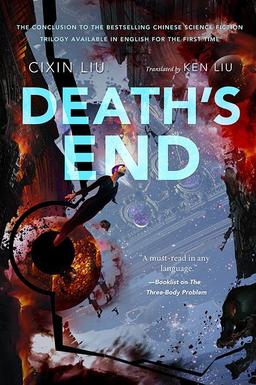
Looking ahead to the next 10-15 years, what does the success of The Three-Body Problem with American readers mean for Chinese SF? Will it help make foreign SF of all kinds more appealing to American readers?
I found Locus critic Gary K. Wolfe’s comments in his August 28th article in the Chicago Tribune, “Hugo Awards: Rabid Puppies defeat reflects growing diversity in science fiction,” to be particularly insightful. In addition to pointing out how the upstart “Puppy slates” were frustrated at the awards this year, he makes several excellent points.
First, that this is the first year in which the Hugos went exclusively to non-English language works, surely a watershed for an organization that takes pride in calling itself the World Science Fiction Society. And second, that the winning works — those not on the Puppy slate — in fact represent near-perfect examples of the kind of work the Puppies were lamenting doesn’t get published any more.
Here’s part of Wolfe’s comments:
The major award, Best Novel, went to China’s Cixin Liu for The Three Body Problem, which, translated by Ken Liu, became the first non-English language novel to win a Hugo. Best Novelette went to the Netherlands author Thomas Olde Heuvelt for “The Day the World Turned Upside Down,” a title which might well describe the tumultuous summer leading up to the awards ceremony.
Heuvelt’s story was translated from the Dutch by Lia Belt, making this also the first year in which no English-language works received a Hugo Award for fiction…
The final irony in all this is that the Hugo Awards, while more diverse and international in recent years, have never really disdained the kind of adventure fiction that the Puppies claim to champion. I met the winning novelist, Cixin Liu, when he was in Chicago earlier this year, and he made it clear that his idols are classic writers like Robert A. Heinlein and Isaac Asimov. The Three-Body Problem itself concerns communications with an alien race, the Trisolarans, whose plan is to invade the Earth as a refuge for their own endangered civilization — surely one of the oldest plots in science fiction. John Scalzi, who became one of the chief targets of Puppy vituperation, is a white male who won the Hugo in 2013 for Redshirts, a space opera adventure with knowing references to Star Trek. Among the novellas bumped off the ballot this year by the Puppy slate was Nancy Kress’ Yesterday’s Kin, a well-written tale that begins with an alien spaceship parking itself over New York harbor.
The problem, I suspect, is that none of these works are only about revisiting these favored old tropes. Sometimes they satirize them (as with Scalzi). Sometimes they introduce political themes (as with Cixin Liu, whose novel opens with a harrowing account of China’s Cultural Revolution).
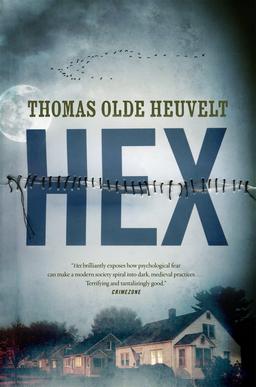 You’ll note that the other Hugo winner Wolfe talks about — Dutch writer Thomas Olde Heuvel — is the subject of Gorinsky’s next project. Hex, Heuvel’s first novel in English, will be published by Tor on April 26, 2016.
You’ll note that the other Hugo winner Wolfe talks about — Dutch writer Thomas Olde Heuvel — is the subject of Gorinsky’s next project. Hex, Heuvel’s first novel in English, will be published by Tor on April 26, 2016.
All this upheaval in the industry isn’t limited to novels. Late last year Clarkesworld, arguably the leading online SF magazine, with a World Fantasy Award, three Hugo Awards, and a British Fantasy Award under its belt, raised over $12,000 for their Chinese Science Fiction Translation Project, and now every issue of the magazine includes a science fiction story translated from the Chinese. Check out the latest issue, containing “Security Check” by Han Song, originally published in Southern People Weekly Magazine and translated by Storycom, here.
Finally, is this the beginning of the “Chinese invasion?” Will Chinese SF writers invade the US market, the same way British music inundated the US in the 60s? Will it open doors? Can science fiction be an ambassador to help America understand China, and vice versa? Can countries, I dunno, come together through literature?
Back to Liz again:
For an SF editor, I’m fairly averse to future prediction, so all I can say is that I hope the success of Three-Body will lead to more opportunities and success for international fiction. I’m not sure I believe that this is the beginning of a vast wave of Chinese SF taking over the entire SF market, but I’d love to get to the point where people realize that not only can they love Chinese SF, but also that Chinese SF is not a monolith, that there’s as much diversity within the writing from any particular country as there is between countries.
I wouldn’t go so far as to proclaim that publishing translated literature will lead to world peace, or anything, but I do think that anything that helps people understand that people on the other side of the world are as complex, interesting, sophisticated, and heterogeneous as the people in our own towns can potentially increase global understanding and reduce cultural stereotyping, at least for the individuals who choose to engage with that literature.
Regardless of how the market for Chinese science fiction shapes itself over the next few years, Tor and Gorinsky are riding a wave of success with Cixin Liu. His first two novels are the most exciting SF releases of the year, and the third, Death’s End, is scheduled to arrive on April 5, 2016
Check them out. And see all our recent coverage of the best new SF and fantasy releases here.
[…] Black Gate published a nice piece: “Cixin Liu the Superstar: How Taking a Risk on a Chinese Author Paid of Big For Tor” […]
I heard Ken Liu speak at Readercon about the process of translating a Chinese literary work into English and into American culture, two equally daunting tasks. He looked at previous attempts to translate between the two, including 19th-century Chinese authors writing about America. Then, he outlined his own approach for The Three-Body Problem and how he tried to deal with the differing linguistic and literary environments. For example, Chinese readers expect plenty of allusions to famous figures (real or fictional), which leads to the question of leaving them as-is in the text and annotating (footnotes, anyone?) or “translating” them into some American historical/fictional equivalent. Mr. Liu decided to go more with the first approach than the second.
The talk was fascinating and easily could have filled twice the time allotted. Perhaps Mr. Liu could write a short essay for Black Gate on the topic.
That’s a great suggestion, Eugene!
[…] Perhaps the most buzzed about science fiction novel of the year is Chinese writer Liu Cixin’s The Three-Body Problem. The world owes Ken Liu a debt of gratitude for bringing Liu’s work to English […]
[…] with my conversation with Liz Gorinski last month about Cixin Liu’s Hugo Award-winning novel The Three-Body Problem, I didn’t intend for it to turn into an interview, but it kind of did. I’ve collected […]
Cixin Liu’s example could prove to be a pathfinder not only for literature translated from Chinese, but also from several other languages, including, who knows even Italian a language whose sci-fi authors have hardly ever crossed the “Pillars of Hercules.”
Who knows when the time will come when an SF writer born in Rome, Florence or Sicily can achieve, if not surpass, the success of “The Three-Body Problem” in the land of Heminguay and Kerouac.
Maybe with something unusual, like a “dystopian-sports” novel that caresses traditional SF themes like time travel and humanoid robotics, but also squashes the eye of fans of a wonderful sport like soccer…